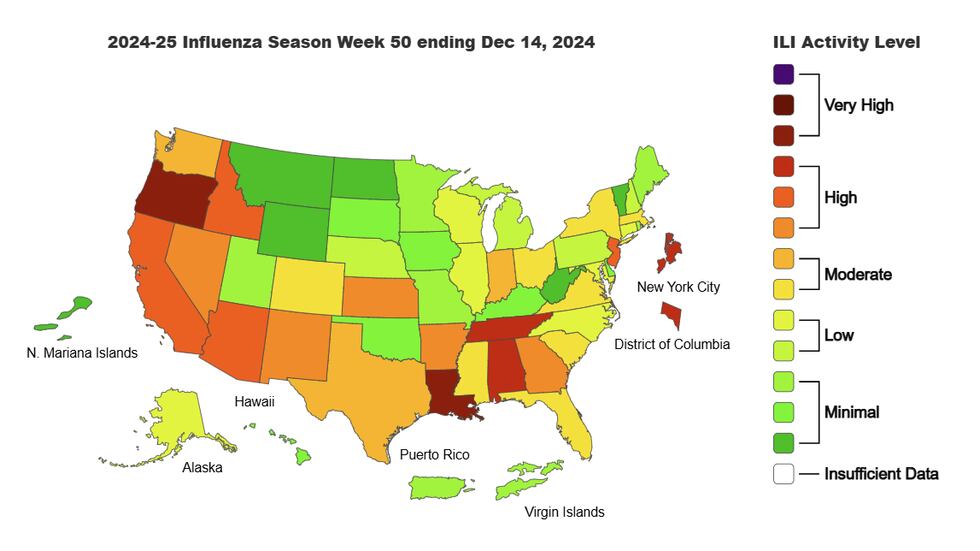‘Everyone is sick’: Flu cases continue to rise in Ga.
AUGUSTA, Ga. - Georgia flu cases have surged to “high” levels, according to the latest data from the Atlanta-based Centers for Disease Control and Prevention.
As of Friday, the amount of acute respiratory illnesses causing people to seek healthcare is high nationally.
“Everyone is sick. Everyone is walking around coughing, hacking – it’s just spreading,” said Shanay Smith, a Georgia nurse practitioner.
Smith said she has seen increased confirmed cases of Flu A and Flu B.
With holiday gatherings spreading many winter illnesses, we can probably expect more flu cases in the days ahead.
In the latest report, 13 states reported high or very high levels of flu-like illness, about double from the week before.
“It’s been increasing at a pretty steady pace now for the past several weeks. So yeah, we are certainly in flu season now,” said Alicia Budd at the Centers for Disease Control and Prevention.
Georgia is one of the states with a high level. Cases are rated as moderate in South Carolina.

Of course, there are a number of bugs that cause fever, cough, sore throat and other flu-like symptoms. One is COVID-19. Another is RSV, or respiratory syncytial virus, which is a common cause of cold-like symptoms but can be dangerous for infants and the elderly.
The most recent CDC data shows COVID-19 and RSV activity continues to increase across the country.
The CDC measures wastewater activity levels and emergency room visits with COVID, the flu and RSV.
Wastewater viral activity is a measure of how much a virus is present in sewage.
Looking at things locally, using Richmond County as an example, the CDC shows minimal COVID-19 ER visits and wastewater activity.
However, there are high levels of flu activity in the wastewater activity and the ER.
The same goes for RSV. The only difference is the CDC shows a very high level of RSV in wastewater.
HEALTH HELP
Symptoms: Is it a cold, the flu or COVID?
- COVID symptoms may include fever or chills, cough, body aches, headaches, tiredness, shortness of breath and loss of taste or smell.
- Centers for Disease Control and Prevention experts say a sore throat, sneezing, itchy or watery eyes, and a running or stuffy nose are less common with COVID-19.
- Someone with the flu may experience all these ailments, but the loss of taste or smell is more frequent with COVID-19.
- When it comes to colds, fever or chills are not common, but you may have a cough, body aches, tiredness, be sneezing or have a runny or stuffy nose.
- In winter months, even allergies can act up, but generally that will not cause fever or chills, body aches or a loss of taste or smell.
The CDC called the start of flu season based on several indicators, include lab results for patients in hospitals and doctor’s offices, and the percentage of emergency department visits that had a discharge diagnosis of flu.
Georgia Access insurance enrollment deadline extended
There’s good news for Georgia families who still need health benefits. The deadline to enroll in Georgia’s newest health insurance has been extended.

No flu strain seems to be dominant, and it’s too early in the season to know how good a match the flu vaccine will be, Budd said.
Last winter’s flu season was considered “moderate” overall, but it was long — 21 weeks — and the CDC estimated there were 28,000 flu-related deaths. It was unusually dangerous for children, with 205 pediatric deaths reported. That was the highest number ever reported for a conventional flu season.
The long season was likely a factor, Budd said. Another factor was a lack of flu vaccinations. Among the children who died who were old enough for flu vaccinations — and for whom their vaccination status was known — 80% were not fully vaccinated, according to the CDC.
Telehealth changes coming to Georgia Medicare recipients
The U.S. Department of Health and Human Services announced changes to telehealth coverage under Medicare.

Vaccination rates for children are even lower this year. As of Dec. 7, about 41% of adults had received a flu vaccination, similar to the rate at the same point last year. The percentage is the same for kids, but for them that’s a drop from a year ago, when 44% were vaccinated against the flu, according to CDC data.
Vaccination rates are lower still against COVID-19, with about 21% of adults and 11% of children up to date.
Flu experts suggest everyone get vaccinated.
“All those gatherings that are so heartwarming and fun and joyous are also an opportunity for this virus to spread person to person,” said Dr. William Schaffner, an infectious diseases expert at Vanderbilt University. “It’s not too late to get vaccinated.”
Copyright 2024 WRDW/WAGT. All rights reserved.














